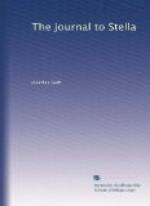13 Forster suggests that Swift wrote “Frond " or “Frowde” and there is every reason to believe that this was the case. No Colonel Proud appears in Dalton’s Army Lists. A Colonel William Frowde, apparently third son of Sir Philip Frowde, Knight, by his third wife, Margaret, daughter of Sir John Ashburnham, was appointed Lieutenant-Colonel in Colonel Farrington’s (see note 18) Regiment of Foot in 1694. He resigned his commission on his appointment to the First Life Guards in 17O2, and he was in this latter regiment in 17O4. In November and December 1711 Swift wrote of Philip Frowde the elder (Colonel William Frowde’s brother) as “an old fool,” in monetary difficulties. It is probable that Swift’s Colonel Proud (? Frowde) was not Colonel William Frowde, but his nephew, Philip Frowde, junior, who was Addison’s friend at Oxford, and the author of two tragedies and various poems. Nothing seems known of Philip Frowde’s connection with the army, but he is certainly called “Colonel” by Swift, Addison, and Pope (see Forster’s Swift, 159; Addison’s Works, v. 324; Pope’s Works, v. 177, vi. 227). Swift wrote to Ambrose Philips in 17O5, “Col. Frond is just as he was, very friendly and grand reveur et distrait. He has brought his poems almost to perfection.” It will be observed that when Swift met Colonel “Proud” he was in company with Addison, as was also the case when he was with Colonel “Freind” (see Letter 3, note 25).
14 Charles Davenant, ll.D., educated at Balliol College, Oxford, was the eldest son of Sir William Davenant, author of Gondibert. In Parliament he attacked Ministerial abuses with great bitterness until, in 17O3, he was made secretary to the Commissioners appointed to treat for a union with Scotland. To this post was added, in 17O5, an Inspector-Generalship of Exports and Imports, which he retained until his death in 1714. Tom Double, a satire on his change of front after obtaining his place, was published in 17O4. In a Note on Macky’s character of Davenant, Swift says, “He ruined his estate, which put him under a necessity to comply with the times.” Davenant’s True Picture of a Modern Whig, in Two Parts, appeared in 17O1-2; in 17O7 he published “The True Picture of a Modern Whig revived, set forth in a third dialogue between Whiglove and Double,” which seems to be the piece mentioned in the text, though Swift speaks of the pamphlet as “lately put out.”
15 Hugh Chamberlen, the younger (1664-1728), was a Fellow of the College of Physicians and Censor in 17O7, 1717, and 1721. Atterbury and the Duchess of Buckingham and Normanby were among his fashionable patients. His father, Hugh Chamberlen, M.D., was the author of the Land Bank Scheme of 1693-94.
16 Sir John Holland (see Letter 3, note 28).
17 Swift may mean either rambling or gambolling.
18 Thomas Farrington was appointed Colonel of the newly raised 29th Regiment of Foot in 17O2. He was a subscriber for a copy of the Tatler on royal paper (Aitken, Life of Steele, i. 329, 33O).




